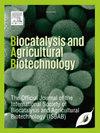Phytopurifying activity of Salvia officinalis L. from Tunisia
IF 3.4
Q2 BIOTECHNOLOGY & APPLIED MICROBIOLOGY
引用次数: 0
Abstract
The sage (Salvia officinalis L.) is an annual and biennial plant of Mediterranean origin from the Lamiaceae family. It's a valuable medicinal plant, which is widely used in traditional medicine in world and in Tunisia; this species is very rich in active biological compounds.
The objective of this study was to determine the phyto-purifying activity of sage essential, fixed oil and ethanolic extracts in an extensive wastewater purification system of Tunisian national sanitation office. We have measured the physico-chemical parameters of wastewater treated with sage oils and extracts. Then, we have carried out a bacteriological analysis of this wastewater.
Our results showed that pH values measured following treatment with sage essential oil gave a pH close to neutral. Therefore, this water can be used for irrigation. In addition, the sage leaves and stems have a considerable effect on the salinity and caused a very remarkable increase in electrical conductivity of the wastewater, the measure of elimination rate demonstrated the effectiveness of sage extracts in eliminating all the microorganisms existing in wastewater.
In fact, sage essential oil has the greatest effectiveness in reducing the chemical oxygen demand of the wastewater and we have noticed that a decrease in chemical oxygen demand of microorganisms existing in the wastewater was necessarily accompanied by a decrease in biological oxygen demand. Therefore, sage leaves and stems were more effective in reducing suspended matter existing in wastewater.
突尼斯丹参的植物净化活性
鼠尾草(Salvia officinalis L.)是唇形科鼠尾草属的一年生和二年生地中海植物。本研究的目的是确定鼠尾草精油、固定油和乙醇提取物在突尼斯国家卫生局的广泛废水净化系统中的植物净化活性。我们测量了用鼠尾草油和提取物处理过的废水的物理化学参数。结果表明,用鼠尾草精油处理后测量的 pH 值接近中性。因此,这种水可以用于灌溉。此外,鼠尾草茎叶对盐度也有相当大的影响,使废水的电导率显著提高,消除率的测量结果表明鼠尾草提取物能有效消除废水中存在的所有微生物。因此,鼠尾草叶和茎对减少废水中的悬浮物更有效。
本文章由计算机程序翻译,如有差异,请以英文原文为准。
求助全文
约1分钟内获得全文
求助全文
来源期刊

Biocatalysis and agricultural biotechnology
Agricultural and Biological Sciences-Agronomy and Crop Science
CiteScore
7.70
自引率
2.50%
发文量
308
审稿时长
48 days
期刊介绍:
Biocatalysis and Agricultural Biotechnology is the official journal of the International Society of Biocatalysis and Agricultural Biotechnology (ISBAB). The journal publishes high quality articles especially in the science and technology of biocatalysis, bioprocesses, agricultural biotechnology, biomedical biotechnology, and, if appropriate, from other related areas of biotechnology. The journal will publish peer-reviewed basic and applied research papers, authoritative reviews, and feature articles. The scope of the journal encompasses the research, industrial, and commercial aspects of biotechnology, including the areas of: biocatalysis; bioprocesses; food and agriculture; genetic engineering; molecular biology; healthcare and pharmaceuticals; biofuels; genomics; nanotechnology; environment and biodiversity; and bioremediation.
 求助内容:
求助内容: 应助结果提醒方式:
应助结果提醒方式:


